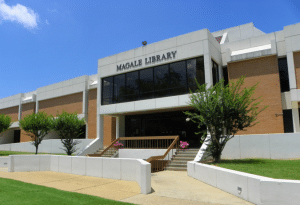The mission of the John F. and Joanna G. Magale Library is to support the mission of Southern Arkansas University, that is, to provide “opportunities for intellectual growth, individual enrichment, skill development, and meaningful career preparation.” The library realizes its purpose by providing access to materials and information supporting the instructional, service, and research programs of the University. Magale Library addresses these services primarily to the students, faculty, and staff of the University, and secondarily to citizens of the state and region.

Magale Library at SAU
Magale Library Goals
Goal 1: To meet the academic needs of the University in support of creative scholarly teaching and active student learning.
Goal 2: To recreate our physical space and add additional technologies to better meet the needs of our patrons.
Goal 3: To actively engage with the regional, local, and SAU communities.
The library provides resources that support SAU in its “responsibility for developing in its students those values and competencies essential for effective citizenship in an ever-changing, free, and democratic society.”
Information Literacy
Magale Library staff work to support SAU’s Learning Goals and Objectives, focusing closely on Goal 4: Information Literacy. The library staff align their work with the Association of College and Research Libraries (ACRL) Guidelines, including the Information Literacy Competency Standards for Higher Education and Framework for Information Literacy for Higher Education.
University Learning Goals and Objectives
- Effective Communication
Our graduates can communicate effectively. Effective communication embraces oral, visual, and language arts, including the ability to listen, speak, read, and write. It includes the effective use of various resources and technology for personal and professional communication.
- Our students can write effectively.
- Our students can effectively deliver an oral presentation.
- Personal and Social Responsibility
Our graduates are prepared to be personally and socially responsible citizens, having the ability to apply knowledge and skills that encourage responsible civic engagement for the advancement of society. This includes an understanding of their own and other cultures and societies and the ability to make informed and ethical decisions.
- Our students demonstrate an understanding of the diversity of their own and other societies and cultures.
- Our students demonstrate an understanding of the process of making informed and ethical decisions.
- Our students demonstrate an understanding of facts within historical and cultural contexts.
- Critical Thinking
Our graduates can think critically, solve problems, and make informed decisions. Critical thinking is the ability to analyze, synthesize, and evaluate information and ideas from multiple perspectives. It includes the accurate use of terminology, information literacy, the application of scholarly and scientific methods, logical argument, and the capability for analysis and problem-solving.
- Our students use appropriate quantitative skills in making decisions.
- Our students demonstrate an ability to think critically and creatively to analyze and solve problems.
- Information Literacy
Our graduates can use technology effectively in their fields. Information literacy is the ability to determine the nature of required information, to access it effectively and efficiently, and to evaluate it critically. It includes the responsible, legal, and ethical use of information.
- Content Knowledge
Our graduates have content knowledge in their chosen fields and the necessary skills to be successful. Content knowledge is discipline and degree-specific.
Information Literacy Competency Standards for Higher Education (ACRL, 2000):
- Determine the extent of information needed
- Access the needed information effectively and efficiently
- Evaluate information and its sources critically
- Incorporate selected information into one’s knowledge base
- Use information effectively to accomplish a specific purpose
- Understand the economic, legal, and social issues surrounding the use of information, and access and use information ethically and legally
Framework for Information Literacy for Higher Education (ACRL, 2015):
Authority Is Constructed and Contextual
- Information resources reflect their creators’ expertise and credibility and are evaluated based on the information need and the context in which the information will be used. Authority is constructed in that various communities may recognize different types of authority. It is contextual in that the information need may help to determine the level of authority required.
Information Creation as a Process
- Information in any format is produced to convey a message and is shared via a selected delivery method. The iterative processes of researching, creating, revising, and disseminating information vary, and the resulting product reflects these differences.
Information Has Value
- Information possesses several dimensions of value, including as a commodity, as a means of education, as a means to influence, and as a means of negotiating and understanding the world. Legal and socioeconomic interests influence information production and dissemination.
Research as Inquiry
- Research is iterative and depends upon asking increasingly complex or new questions whose answers, in turn, develop additional questions or lines of inquiry in any field.
Scholarship as Conversation
- Communities of scholars, researchers, or professionals engage in sustained discourse with new insights and discoveries occurring over time as a result of varied perspectives and interpretations.
Searching as Strategic Exploration
- Searching for information is often nonlinear and iterative, requiring the evaluation of a range of information sources and the mental flexibility to pursue alternate avenues as new understanding develops.
